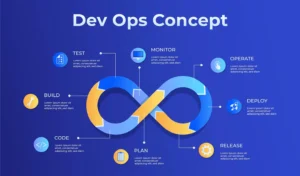In the rapidly evolving world of software development, deploying applications efficiently and reliably is not a luxury—it’s a necessity. A combination of development (Dev) and operations (Ops), DevOps has become the de facto standard for deploying software in a continuous, automated, and reliable manner. But why has DevOps become almost a must for software deployment in 2025?
This article explores the reasons behind DevOps’ dominance, detailing how it transforms traditional practices, its key components, and the undeniable benefits it offers to modern organizations.
Understanding DevOps: A Brief Overview
DevOps is a technological and cultural movement rather than merely a collection of tools. It focuses on breaking down silos between software developers and IT operations teams to improve collaboration, automation, and monitoring throughout the software development lifecycle (SDLC).
- At its core, DevOps aims to
- Automate the software delivery process.
- Shorten development cycles.
- Improve deployment frequency.
- Ensure system reliability and scalability.
Continuous Integration (CI), Continuous Delivery (CD), Infrastructure as Code (IaC), and monitoring are all included in a single, coherent workflow by DevOps approaches.
The Traditional Deployment Model: A Bottleneck
Before DevOps, software deployment was often siloed and sequential. After writing the code, developers send it “over the wall” to the operations team. This model introduced several issues:
- Lack of collaboration—developers and ops had conflicting priorities.
- Slow release cycles—Manual testing and deployment introduced delays.
- Higher error rates—Configuration mismatches and manual setups led to failures.
- Poor feedback loops—issues discovered in production often came too late.
As businesses shifted toward agile methodologies, the traditional deployment model could no longer keep up. Companies needed a way to deploy software faster, safer, and more frequently. DevOps answered that call.
Why DevOps Is a Game-Changer in Software Deployment
1. Speed and Efficiency
DevOps enables organizations to deploy code faster and more efficiently through automation. Minutes may now be used to complete tasks that once took hours or days.
Build, test, and deployment procedures are automated via CI/CD pipelines.
Infrastructure provisioning is automated via Infrastructure as Code (IaC) solutions such as Terraform or Ansible.
This rapid deployment model allows teams to respond to market demands in real-time, which is crucial in 2025’s fast-paced tech landscape.
2. Improved Collaboration and Culture
DevOps fosters a shared responsibility model, where developers and operations work together from day one. This collaborative culture reduces blame, improves communication, and results in more resilient systems.
Key cultural changes include:
- Emphasis on transparency and feedback.
- Cross-functional teams with shared KPIs.
- Continuous learning and improvement.
Tools like Slack, Jira, and Microsoft Teams support this real-time collaboration, ensuring everyone is aligned with deployment goals.
3. Enhanced Quality through Automation
One of DevOps’ main strengths lies in automated testing and quality assurance. Every code commit is automatically tested, reducing human errors and catching bugs early in the pipeline.
Common automated testing types include
- Unit testing
- Integration testing
- End-to-end testing
- Security scans
DevOps guarantees that only code of the highest caliber makes it to production by integrating testing into each step of development.
4. Scalability and Reliability
By utilizing cloud infrastructure and container orchestration technologies like Kubernetes and Docker, DevOps places a strong emphasis on scalability.
- Applications can auto-scale based on user demand.
- Infrastructure can be version-controlled and replicated easily.
- Fault tolerance and load balancing provide high availability.
Furthermore, real-time insights into system performance are provided by monitoring tools like as Prometheus, Grafana, and ELK Stack, which guarantee dependability both during and after deployment.
5. Faster Time-to-Market
In industries like e-commerce, fintech, and healthcare, speed-to-market can determine a product’s success. DevOps accelerates this by enabling multiple deployments per day without compromising stability.
This agility is a significant competitive advantage.
- Features reach users faster.
- Bugs are fixed quickly.
- Customer feedback loops are shorter.
For startups and enterprises alike, DevOps means the ability to experiment, iterate, and improve continuously.
6. Cost Savings and Resource Optimization
Manual deployments are resource-intensive and prone to errors that can lead to costly downtime. DevOps automates these tasks, freeing up human resources for strategic initiatives.
Cost benefits include
- Reduced downtime and service interruptions.
- Lower cloud infrastructure costs via auto-scaling.
- Minimized rework due to better QA processes.
Organizations implementing DevOps report significant ROI through reduced failures and increased productivity.
7. Security Integration (DevSecOps)
In 2025, security is not an afterthought—it’s integrated from the beginning. DevSecOps, which incorporates security checks into CI/CD pipelines, is an evolution of DevOps.
Security practices include
- Static and dynamic code analysis.
- Secrets management (e.g., HashiCorp Vault).
- Role-based access control (RBAC).
- Continuous compliance monitoring.
By ensuring that vulnerabilities are discovered before production, this shift-left strategy lowers risks and regulatory concerns.
To become an expert in DevOps, take the DevOps Training in Pune course.
Real-World Success Stories of DevOps Deployment
1. Netflix
Netflix uses its microservices architecture to distribute code hundreds of times every day. Its DevOps pipeline uses tools like Spinnaker for CI/CD, along with real-time monitoring to ensure service reliability.
2. Amazon
Amazon’s deployment infrastructure allows for one deployment every 11.7 seconds. Using DevOps practices, Amazon achieves unmatched scalability and uptime, supporting millions of users globally.
3. Etsy
Etsy turned around its deployment failures by embracing DevOps, reducing deployment times, and increasing developer confidence through automated testing and metrics-based feedback loops.
Common DevOps Tools Supporting Deployment
| Category | Tools |
| CI/CD | Jenkins, GitHub Actions, GitLab CI/CD, CircleCI |
| Configuration Management | Ansible, Puppet, Chef |
| Containerization | Docker, Podman |
| Orchestration | Kubernetes, OpenShift |
| Monitoring | Prometheus, Grafana, Datadog |
| IaC | Terraform, AWS CloudFormation |
| Security | Snyk, Aqua Security, Trivy |
Every tool is essential to automating and expediting the deployment procedure.
Challenges in Adopting DevOps
DevOps has several advantages, yet there are drawbacks to its implementation:
- Cultural Resistance—Shifting mindsets from siloed to collaborative work can be tough.
- Tool Overload—Selecting and integrating tools can be overwhelming.
- Legacy Systems: Modern DevOps techniques might not be supported by older systems.
- Skill Gaps—Teams may lack DevOps expertise or cloud knowledge.
However, with proper training, leadership buy-in, and incremental changes, these challenges can be overcome.
Future of DevOps in Deployment (Beyond 2025)
The DevOps landscape is still evolving. Looking ahead:
- AI and ML will enhance predictive deployment and anomaly detection.
- GitOps will streamline deployments using Git as a source of truth.
- Platform Engineering will provide internal developer platforms (IDPs) for self-service deployments.
- Serverless deployments will become more common, abstracting infrastructure concerns altogether.
- These developments will further speed up, secure, and improve the developer-friendliness of software deployment.
Final Thoughts
DevOps is a requirement in 2025, not a fad. It has transformed how software is developed, tested, deployed, and monitored. DevOps gives organizations a major advantage in terms of agility, quality, and productivity.
Whether you’re a startup releasing MVPs rapidly or an enterprise rolling out global updates, DevOps is your foundation for scalable, secure, and efficient software deployment.
DevOps guarantees that software deployment is no longer a bottleneck but rather a driver of innovation and expansion by encouraging cooperation, embracing automation, and incorporating security.







